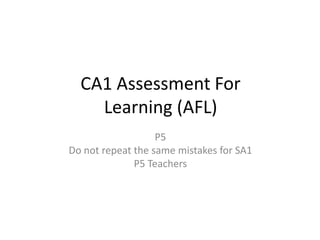
Ca1 assessment for learning (afl) p5 level blog
- 1. CA1 Assessment For Learning (AFL) P5 Do not repeat the same mistakes for SA1 P5 Teachers
- 2. Subject-verb agreement 6) ______ of these men is the thief. The police is investigating. 1)All 2)Both 3)Some 4)Either Note: The subject must agree with the verb As in, singular subject matches with singular verb. Plural subject matches with plural verb.
- 3. Subject-verb agreement Which is correct? All of these men is/ are responsible. Both of these men is/ are responsible. Some of these men is/ are responsible. Either of these men is/ are responsible. Note: Neither of these men is/are responsible. Learning points: Either and neither are seen to be singular subject.
- 4. Subject-verb agreement Learning point: Either and neither are seen to be singular subject. Each, everyone, someone, anyone, no one, everybody, none are also seen to be singular. Is this correct? Everyone are paying attention now. x
- 5. Subject-verb agreement 7) Each of these men ________ the gigantic cargo truck. 1)drive 2)drives 3)driven 4)have driven Note: The subject must agree with the verb Answer: 2
- 6. Infinitive ‘to’ 10) A few people claimed to ______ strange noises coming from the vacant house at night. 1) hears 2) hearing 3) had heard 4) have heard Note: the rule of infinite ‘to’ applies here: eg. to eat, to hear, to climb, to have, etc. Answer: 4) have heard Is this correct? Many boys wanted to ran across the road. x
- 7. Infinitive ‘to’ NOTE: however, there are exception to this rule for ‘to’ at times, it is not used as an infinite ‘to’. In the case of gerunds, for example: Peter prefers coffee to tea. OR Peter prefers walking to running. In the above example, the rule of infinite ‘to’ is not applied, as the phrase ‘prefers …to…’ is comparing 2 activites. ‘Running’ is the activity.
- 8. Sensory verbs 12) The neighbour saw a man _______ over the fence last night. 1) climb 2) climbs 3) climbed 4) was climbing Note: Words like ‘saw’, ‘made’, ‘heard’ are sensory verbs. The verb that follows will be in its root form. If you saw him climbed… where’s there to see? As in, if he has already climbed over the fence, what’s there to see? Answer: 1) climb
- 9. Synthesis/ transformation The boy saw Mr Lee. The boy ran away. Upon ______________________________________________. Note: The word ‘upon’ demands a gerund (an activity ending with –ing) Tip: Use the verb that is given, change it into a gerund. In this case, see. Therefore, seeing. Answer: Upon seeing Mr Lee, the boy ran away.
- 10. Synthesis/ transformation Dave is strong and muscular. He swims daily. ________________________who __________________________. Note: the pronoun ‘who’ is used here to describe Dave. Learning point: Either encased the details with a pair of commas or drop the commas entirely. Answer: Dave, who is strong and muscular, swims daily. Or Dave who is strong and muscular swims daily.
- 11. Synthesis/ transformation Dennis asked Rose, “Where did you keep my calculator?” Dennis asked Rose ___________________________________. Note: This is a direct to indirect speech question. You will need to note the changes for pronouns, tenses, time and place. Reminder: You should not apply the above rule for all synthesis and transformation; this is only meant for direct to indirect speech or vice versa. Answer: Dennis asked Rose where she had kept his calculator.
- 12. Synthesis/ transformation Jenny used to be a national fencer. She was young then. In her ______________________________________________. Note: This question requires a noun (abstract noun) Change the given adjective to a noun. In this case, it is ‘young’ to ‘youth’. More examples: ‘beautiful’ to ‘beauty’ determined to determination strong to strength, etc. Answer: In her youth, Jenny used to be a national fencer.
- 13. Synthesis/ transformation Both my brothers were out yesterday. Neither of _________________________________________. Note: Neither is seen to be singular. Remember to apply SVA. Note: The time tag, ‘yesterday’ should not be changed to ‘the previous day’ as this is not a direct to indirect speech question. Answer: Neither of my brothers was out yesterday.
- 14. Synthesis/ transformation Note: There is another rule to remember for ‘Neither’ if it is paired with ‘nor’. This rule also applies for ‘Either…. or’. The rule is called rule of proximity (Closeness) Take for example: Neither Peter nor Jane is/are responsible for the broken vase. Neither Peter nor his friends is/are responsible for the broken vase. Either Peter or Jane is/are responsible for the broken vase. Either Peter or his friends is/are responsible for the broken vase.